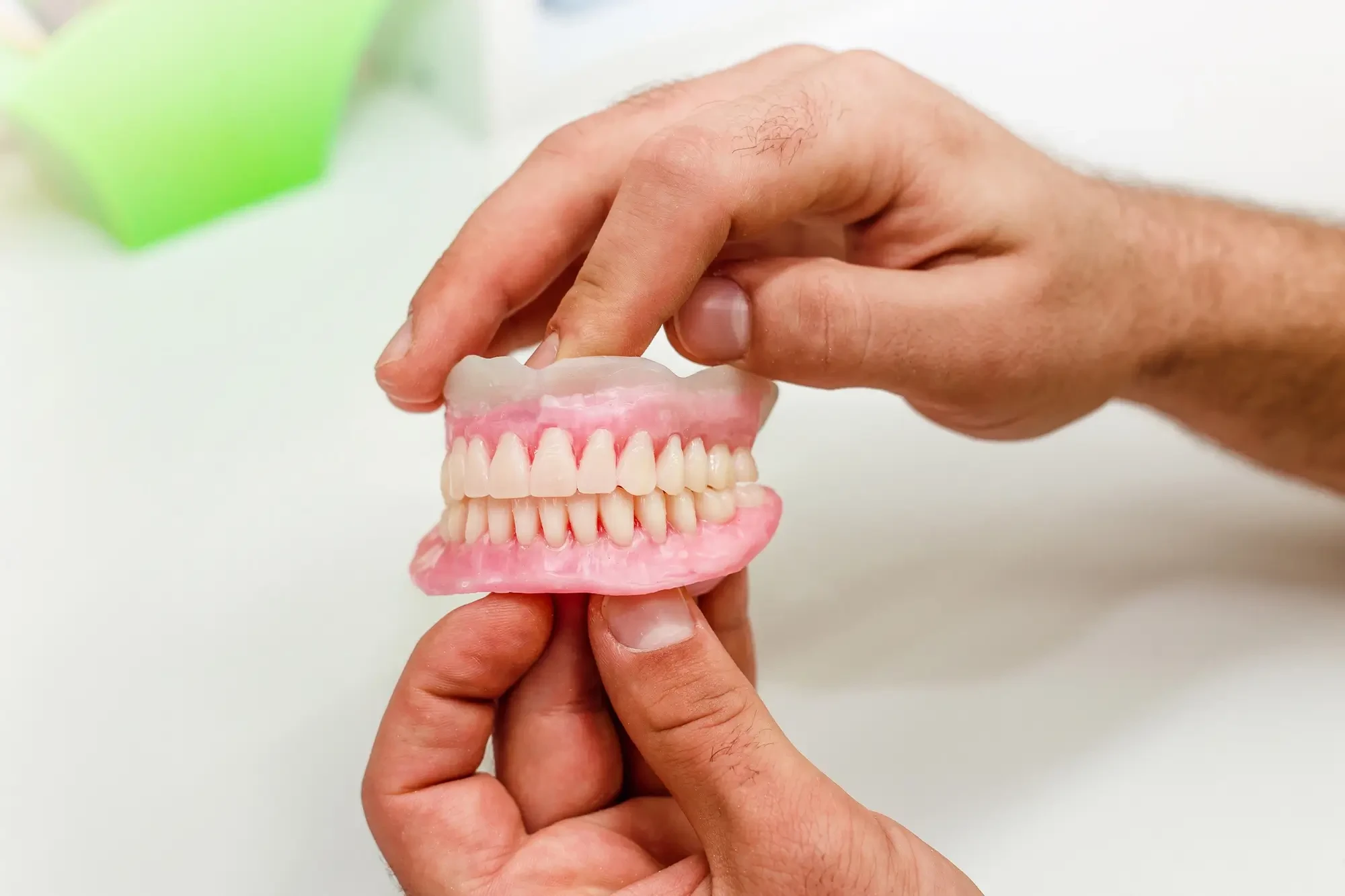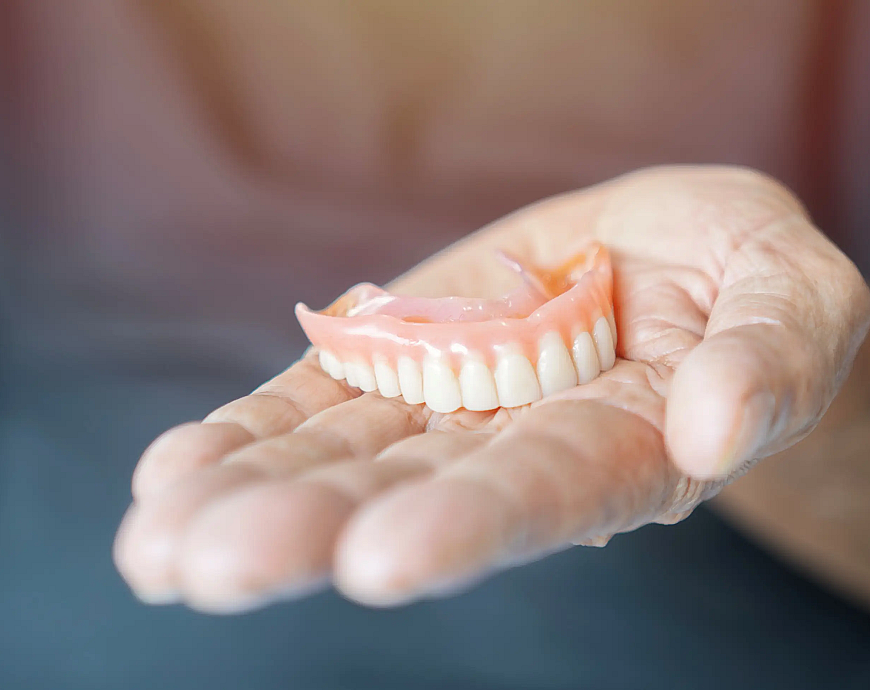Removable dentures are prosthetic devices used in dentistry to restore total or partial edentulism, with major benefits in terms of both aesthetics and functionality. Removable dentures help regain occlusal balance and chewing ability, while also helping to restore self-confidence and improve facial defects. The configuration of current removable dentures precisely adapts to the anatomy of the oral cavity, thus significantly reducing discomfort and the risk of oral mucosal lesions. The costs associated with removable dentures vary depending on the complexity of the procedure, the materials used and the degree of customization, being influenced by the patient's aesthetic and functional preferences.
What is a removable denture
A removable denture is a removable prosthetic device that replaces missing teeth and supports facial landmarks. The denture includes a base made of biocompatible polymers and artificial teeth molded to reproduce the shape and color of the original dental structures. The removable denture adapts perfectly to the anatomy of the oral tissues, so as to ensure stability and efficiency in mastication. It also has the ability to restore phonetic function, facilitating the correct pronunciation of sounds and improving the clarity of speech. Its removable structure allows easy hygiene, preventing the accumulation of bacterial plaque and, implicitly, the appearance of gingival inflammation.
When is a removable denture recommended
A removable denture is recommended in various specific clinical situations, depending on the particularities of each patient, being an effective prosthetic solution for restoring oral functions compromised by tooth loss. General recommendations for the use of a removable denture include the following cases:
- partial or total edentulism;
- clinical situations in which dental implants are contraindicated for medical, anatomical or financial reasons;
- multiple tooth loss affecting mastication and speech;
- severe bone resorption that does not allow the fixation of dental implants;
- the patient's preference for a removable prosthetic solution;
- the need to avoid extensive grinding of healthy teeth, such as in the case of fixed bridges.
It is recommended to perform a detailed assessment of the oral situation by the dentist, who will determine the opportunity to use a removable denture and adapt the treatment according to individual needs. To schedule a consultation and establish a personalized treatment plan, you can access the contact page.
Who is recommended a removable denture
Removable dentures are recommended primarily for patients with multiple tooth loss, as well as for those who are not eligible for fixed prosthetic treatments or dental implants. Elderly patients who have chronic conditions that may affect the effectiveness of treatments or the possibility of performing complex surgical treatments can also benefit from a removable denture. Removable dentures can also be recommended for people with lower budgets or those who, for various reasons, want a removable device.
Advantages of removable dentures
Removable dentures offer numerous clinical and aesthetic benefits for patients with total or partial edentulism. The main advantages of using a removable denture:
- effective restoration of chewing capacity and phonetic function;
- restoration of facial aesthetics by correctly supporting the cheek and lip muscles;
- possibility of simple and effective hygiene, due to the removable nature of the device;
- avoiding grinding of remaining natural teeth;
- easy and quick adaptation of the prosthetic device to anatomical changes in the oral cavity over time;
- lower costs (compared to other fixed prosthetic solutions or dental implants).
How much does a removable denture cost?
The cost of a removable denture depends on several factors, including the complexity of the clinical case, the type of materials used, and the degree of customization required. Determining the price with certainty is done after a detailed evaluation of the clinical parameters.
Removable prosthesis - Price
| Procedure / device | Prire (expressed in RON) |
| Acrylic prosthesis per arch | 2400 |
| Flexible partial/total denture – Flexiplast | 3300 |
| Implant-supported prosthesis | 7500 |
| Denture repair | 300 |
Types of removable dentures
Depending on the structural characteristics and materials from which they are made, removable dentures are classified into several main categories. Among the most commonly used types are the total removable denture, the elastic removable denture, the skeletonized denture and the denture without the palate.
Total removable denture
A total removable denture is a removable prosthetic device intended for the rehabilitation of patients with complete tooth loss (total edentulism) in the upper, lower or both arches. The structure of the total denture is made of an acrylic base, with integrated artificial teeth, which adapt perfectly to the gingival contour and oral mucosa, to ensure optimal retention through adhesion and the vacuum effect created at the contact surfaces.
Elastic removable prosthesis
Elastic removable prosthesis is a special type of prosthetic device made of flexible materials, such as nylon-based polymers, which provide increased adaptability and additional comfort compared to classic rigid acrylic variants. The elastic material used in the manufacture of the prosthesis ensures stable retention and increased comfort during chewing. Elastic prosthesis is particularly recommended for patients with increased sensitivity to pressure, those with advanced bone resorption, as well as people who experience allergic reactions to metal alloys used in the production of conventional prostheses.
Removable skeletal prosthesis
A removable skeletal prosthesis is a removable prosthesis that uses a thin and resistant metal structure, usually made of chromium-cobalt alloys, to support artificial teeth and an acrylic base. Due to the reduced size of the structure and the increased mechanical resistance, the skeletal prosthesis is less bulky and allows the patient to adapt more easily. The skeletal prosthesis is especially indicated for patients with partial tooth loss and who have sufficient natural teeth to fix the prosthetic device.
Denture without a roof of the mouth
A denture without a roof of the mouth is a special prosthetic variant recommended for patients who experience severe discomfort while wearing classic dentures that fully cover the palate. The denture without a roof of the mouth is fixed by special anchoring systems on the remaining natural teeth.
Stages of dental prosthesis treatment
The flow of rehabilitation treatment is established through a series of sequential stages, established on the basis of validated medical protocols. The initial clinical assessment provides objective data on the oral structure and masticatory function. Each subsequent stage aims to optimize functional and aesthetic parameters, in accordance with biomechanical norms.
The stages of treatment include:
- detailed clinical assessment through imaging investigations and functional analyses
- development of the therapeutic plan as well as determination of rehabilitation options.
- accurate dental impression (to obtain a three-dimensional model)
- device fabrication using CAD/CAM technology-assisted techniques (valid for elastic prosthesis);
- functional and aesthetic verification of the prosthesis through simulations and personalized adaptations;
- patient training on how to use and maintain, to extend the lifespan of the prosthesis.

Cleaning removable dentures
The cleaning protocol is based on chemical and mechanical principles, with the aim of eliminating bacterial deposits and food residues. The maintenance strategy involves:
- carrying out periodic evaluations at the dentist;
- using brushes specially designed for cleaning dentures;
- applying recommended disinfectant solutions;
- washing the denture regularly;
- using interdental brushes in difficult-to-reach areas;
- rinsing the denture with water after each meal;
- avoiding exposing the denture to aggressive substances or strong detergents.
Photo source: Freepik
Bibliography:
https://my.clevelandclinic.org/health/treatments/10900-dentures
https://www.arenadentalclinic.com/services/mobile-prosthetics
https://www.cukondental.com/en/dental-prosthesis/mobile-or-removable-dentures
https://www.topdoctors.co.uk/medical-dictionary/removable-dentures
https://oceanbreezeprosthodontics.com/blog/all-you-need-to-know-about-removable-full-dentures-treatment-education-and-more/
https://lastingsmiles.com/blog/removable-vs-permanent-dentures-the-pros-and-cons
https://denturesatvarsity.com.au/pros-cons-of-removable-dentures https://www.dentureliving.com/en-us/advice-tips/types-of-dentures/partials/types-of-partial-dentures
https://www.thedentureshop.com/blogs/the-denture-process
https://www.polident.com/en-us/full-dentures/denture-care/sleeping-with-dentures
Frequently asked questions about removable dentures

Dr. Nicoleta Taran answers questions:
+40787877799
contact@dentarbre.comZona Obor - Colentina - Doamna Ghica, București, Romania
